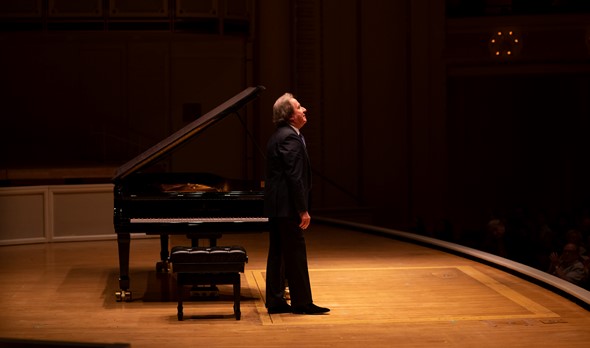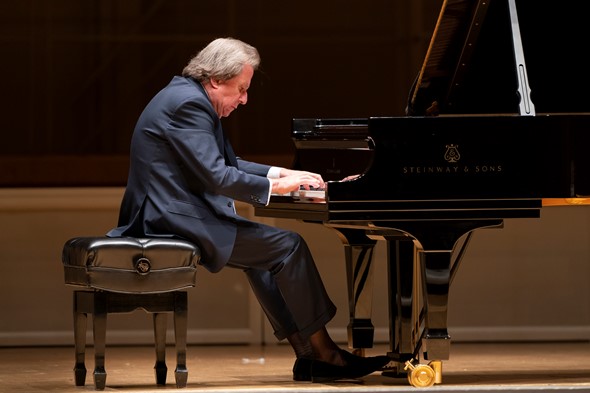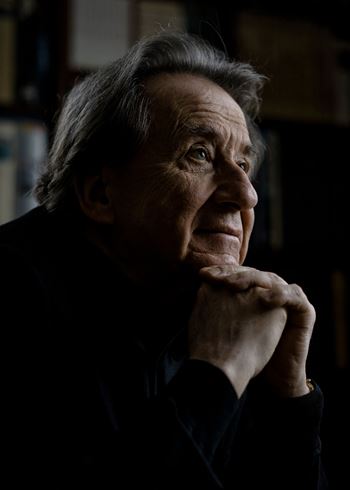Rudolf Buchbinder enters the Beethoven fray
in a blaze of technical glory, but lacking heat
Review: Pianist Rudolf Buchbinder. Beethoven recital Nov. 6 in a multi-pianist series covering the 32 sonatas at Orchestra Hall.
By Lawrence B. Johnson
Listening to Rudolf Buchbinder zip through four Beethoven sonatas, his playing as crisp and sure as it was fleet, I found myself wondering if this is how Beethoven might have performed these pieces – two early sonatas and the formidable “Appassionata.”
It’s not that I thought Buchbinder’s approach was ideal; I didn’t. In fact, for all his impeccable technique, which never failed him even in the “Appassionata’s” blazing finish, and much as I admired his clarity and consistency, turn by turn I kept hoping for more personality, more emotional complexity.
We are all listeners of our time, the conditioned auditors of pianists whose consensus – whose tradition – has produced a conviction of truth in our minds. We carry a powerfully reinforced musical portrait of what Beethoven’s music, whether the symphonies or the piano sonatas, should sound like. It is an image of the composer as self-aware romantic, a willful man and wild spirit, hammering out heated music; this Beethoven is not another incarnation of Haydn, brilliant and imaginative but also cool and contained.
I heard a good deal of Haydn in Buchbinder’s quick, fluent, precisely articulated Beethoven – and not only in the early Sonatas, Op. 2, No. 1 and No. 3, but even in the Sturm und Drang of the great “Appassionata” itself.
Such an objective approach made sense in the Op. 2 sonatas, the first of which was indeed the first sonata that Beethoven wrote, at age 24. While Buchbinder’s incisive playing made clear the boundary-pushing invention of the work’s outer movements, his crystalline turn through the young Beethoven’s broadly drawn and exploratory Adagio showed a significant new voice.
That said, the Op. 2 companion piece, No. 3 in C major, came across as an unequivocal proclamation. It is an ambitious work whose rigorously structured opening and closing chapters Buchbinder imbued with transparency and intellectual force. The elaborately woven Adagio provided another signpost pointing toward a future in which music and Beethoven would be synonymous.
What was not evident in Buchbinder’s way with these formative works was any hint of Beethoven the romantic. Somehow, the composer’s obvious mastery of the piano – he won his early reputation upon arriving in Vienna from his native Bonn, Germany, as a keyboard virtuoso – registered in Buchbinder’s playing as a quality separate from the turbulent spirit behind it. That curious disjunct was about to become curiouser still.
 Buchbinder’s performance of the Sonata in F minor, Op 57 (“Appassionata”) offered a display of unassailable virtuosity. It was assured, swift and potent. It was also remarkably detached.
Buchbinder’s performance of the Sonata in F minor, Op 57 (“Appassionata”) offered a display of unassailable virtuosity. It was assured, swift and potent. It was also remarkably detached.
The pianist’s practiced and knowing, even wizardly, account of the “Appassionata” might have been Bach, so clear-sighted were its surging lines and urgent rhythms. Yet if it conjured spiritual transcendence, it wanted human heat – this consummate example of Beethoven’s so-called middle period, temporal sibling of the Fourth Piano Concerto and the Violin Concerto.
To his undeniable credit, Buchbinder attacked the sonata’s daunting finale with fearless abandon, pushing the tempo ever upward from fast to faster to, well, warp speed. And every note of it drilled with laser-like perfection. In its coolish fashion, it was quite thrilling.
Maybe that’s how Beethoven played, leveling emotions in grand sweeps of low-altitude flight, fingers flying, heart still. Buchbinder surely relates to the sonatas that way: intellectually, formally, mathematically. I missed the something signified by that sound and that fury.
Buchbinder is the second of seven pianists who collectively will play all 32 of Beethoven’s sonatas and other major works over the course of this season under the aegis of Symphony Center Presents. He is one of two, with Andras Schiff, who will give two recitals in the series. Buchbinder returns at 3 p.m. Nov. 10 with the three sonatas of Op. 10 together with the Sonata Op. 31, No. 3.
Related Links:
- Performance and ticket info for Buchbinder’s second Beethoven recital: Details at CSO.org
- Kirill Gerstein, launching Beethoven cycle, sees sonatas as mirror of struggle: Read the interview at ChicagoOntheAisle.com
- Beethoven sonata series opens with a recital beyond ambitious: Read the review at ChicagoOntheAisle.com




I was at that same performance and felt the same thing about the Appassionata – he didn’t “feel” the music but rather just checked the boxes of a very practiced interpretation. Ashkenazy plays it much better because you can sense the struggle between wanting to rip the keys off in a rage and yet wanting to still control every note. The essence of Beethoven for me is struggle and I didn’t hear the struggle.